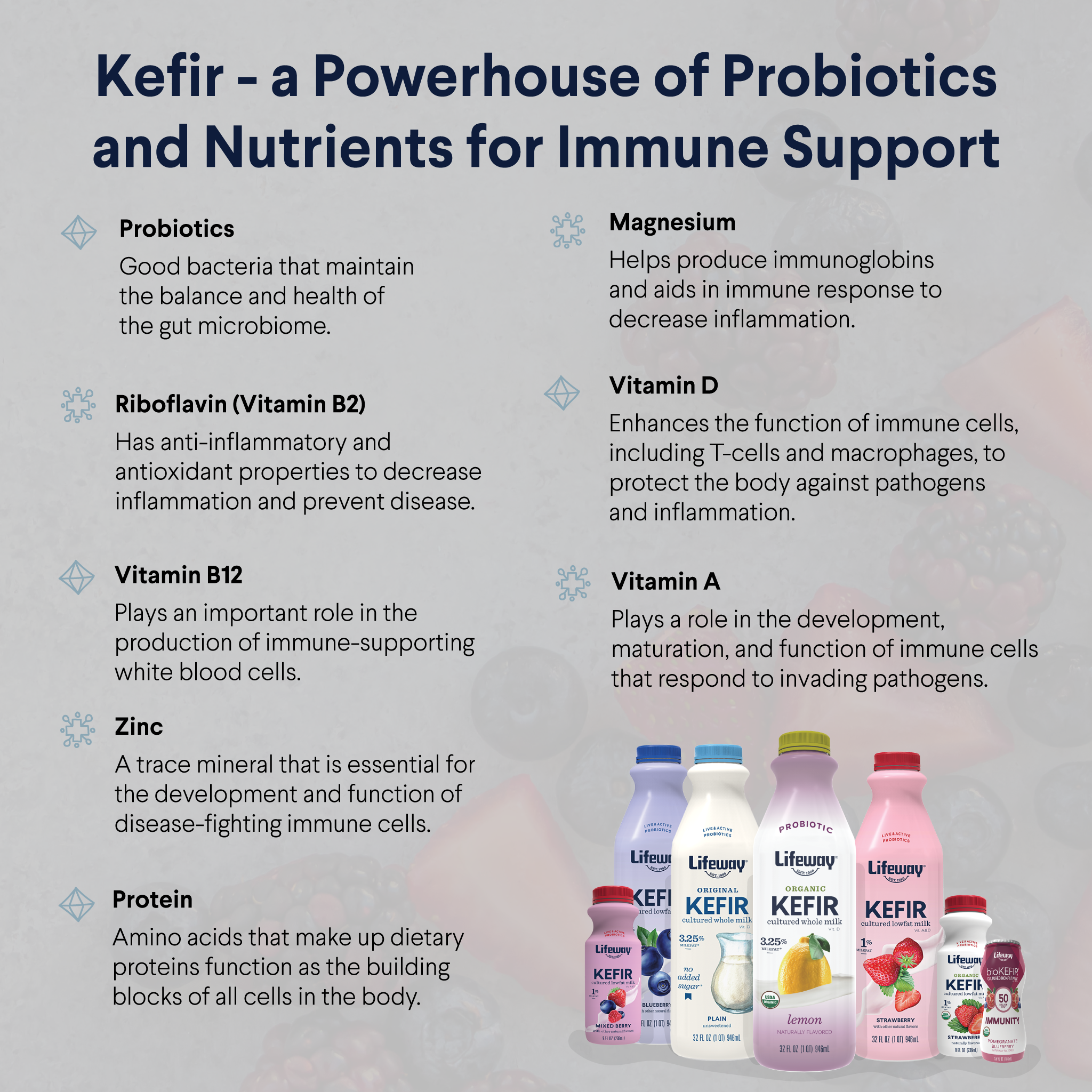Importance of a Balanced Microbiome
Our immune system is top of mind with sick season in high gear. We know that 70-80 percent of the (immunoglunlin-producing) cells that make up the immune system are located in the gut, making it the body’s largest site of immunological response. Therefore, when our microbiome is out of balance, known as dysbiosis, that imbalance may adversely affect our immune system leaving us susceptible to infections and disease. Probiotics consumed in our diet, such as those found in cultured dairy products, may help balance our microbiome, making them a vital part of our immune-boosting toolkit to keep us healthy.

Promising Research
Over the years, there has been much research exploring how probiotics found in foods support the gut microbiome to strengthen the immune system. Some studies that have recently been published build on the science to show the role probiotics play in supporting a healthy immune system and response.
A review in the Annals of Nutrition & Metabolism discusses how probiotics stimulate the immune system by inducing a network of signals facilitated by probiotics to reduce infection and disease. By strengthening the intestinal lining, probiotics work to decrease the inflammatory response in the gut, liver, lung and blood, and reduces the invasive ability of bacteria. These are all beneficial in the fight and prevention of infections, as wells as inflammatory and autoimmune diseases.
A promising review published in the November 2020 issue of Biomedicine & Pharmacotherapy, discusses kefir as a preventative and therapeutic agent to combat viruses, including COVID-19. The summary of research shows that kefir may play a role in reducing inflammation by inhibiting the activity of proinflammatory cytokines such as IL-1β, TNF-α and IL-6, and may be a significant inhibitor of the cytokine storm that contributes to COVID-19. Kefir also helps support the immune system by increasing production of macrophage production, phagocytosis, IgG and IgA cells, B and T cells, neutrophils as well as anti-inflammatory cytokines. The review attributes the benefits are from the nutrients, probiotics and biomolecules found in kefir naturally and produced during fermentation.
Two studies published in Nutrients observed how lactobacillus strains from fermented milk decreased pro-inflammatory Th1 and Th17 cytokines (IL-6 and TNF-α) concentrations and significantly increased anti-inflammatory (IL-10) cytokine concentrations in comparison to control groups. In layman terms, probiotics in the gut may increase the helpful immune cells (anti-inflammatory) and decrease the inflammatory immune response. This response is beneficial in the fight and prevention of inflammatory and autoimmune diseases, as well as prevent infections.
A fifth review published in the Journal of Clinical Gastroenterology summarizes 30 years of research on Lactobacillus rhamnosus GG (LGG), a common probiotic found in cultured dairy products and probiotic supplements. Among many benefits of LGG, the review shows that LGG builds up the strength of the intestinal lining where immunoglunlin-cells are produced, helping to reduce the risk of infections and promote appropriate immune response. LGG also reduces the expression of several activation and inflammation markers on cells, reducing inflammation in our body that may reduce the risk of certain diseases.
Conclusion
The research on probiotics role in the body continues to grow, and further studies are needed to confirm the many benefits they may have in keeping us healthy. Past research is promising and while it is best to talk with a medical professional before taking probiotics as supplements, those that are part of our food system naturally play a role in maintaining the gut microbiome as part of a healthy diet.
References
- Maldonado Galdeano C, Cazorla S, I, Lemme Dumit J, M, Vélez E, Perdigón G: Beneficial Effects of Probiotic Consumption on the Immune System. Ann Nutr Metab 2019;74:115-124. doi: 10.1159/000496426
- Santiago-López L, Hernández-Mendoza A, Mata-Haro V, et al. Effect of Milk Fermented with Lactobacillus fermentumon the Inflammatory Response in Mice. Nutrients. 2018;10(8):1039.
- Reyes-Díaz A, Mata-Haro V, Hernández J, et al. Milk Fermented by Specific Lactobacillus Strains Regulates the Serum Levels of IL-6, TNF-α and IL-10 Cytokines in a LPS-Stimulated Murine Model. Nutrients. 2018;10(6):691.
- Capurso L. Thirty Years of Lactobacillus rhamnosus GG: A Review. J Clin Gastroenterol. 2019;53 Suppl 1:S1–S41.